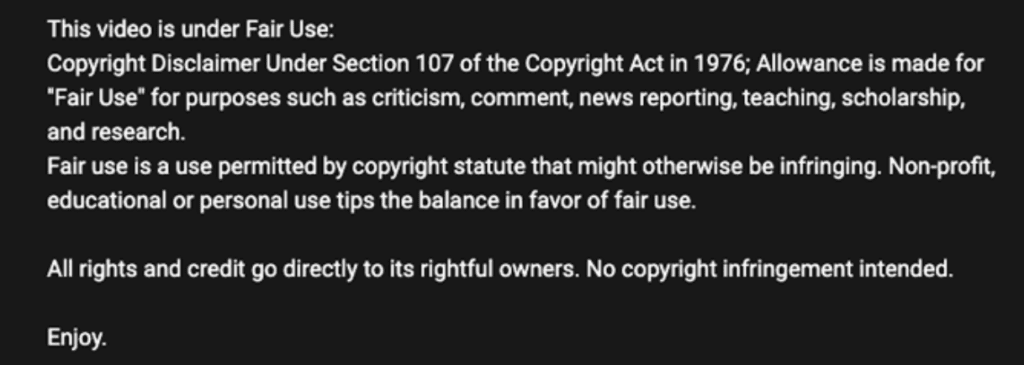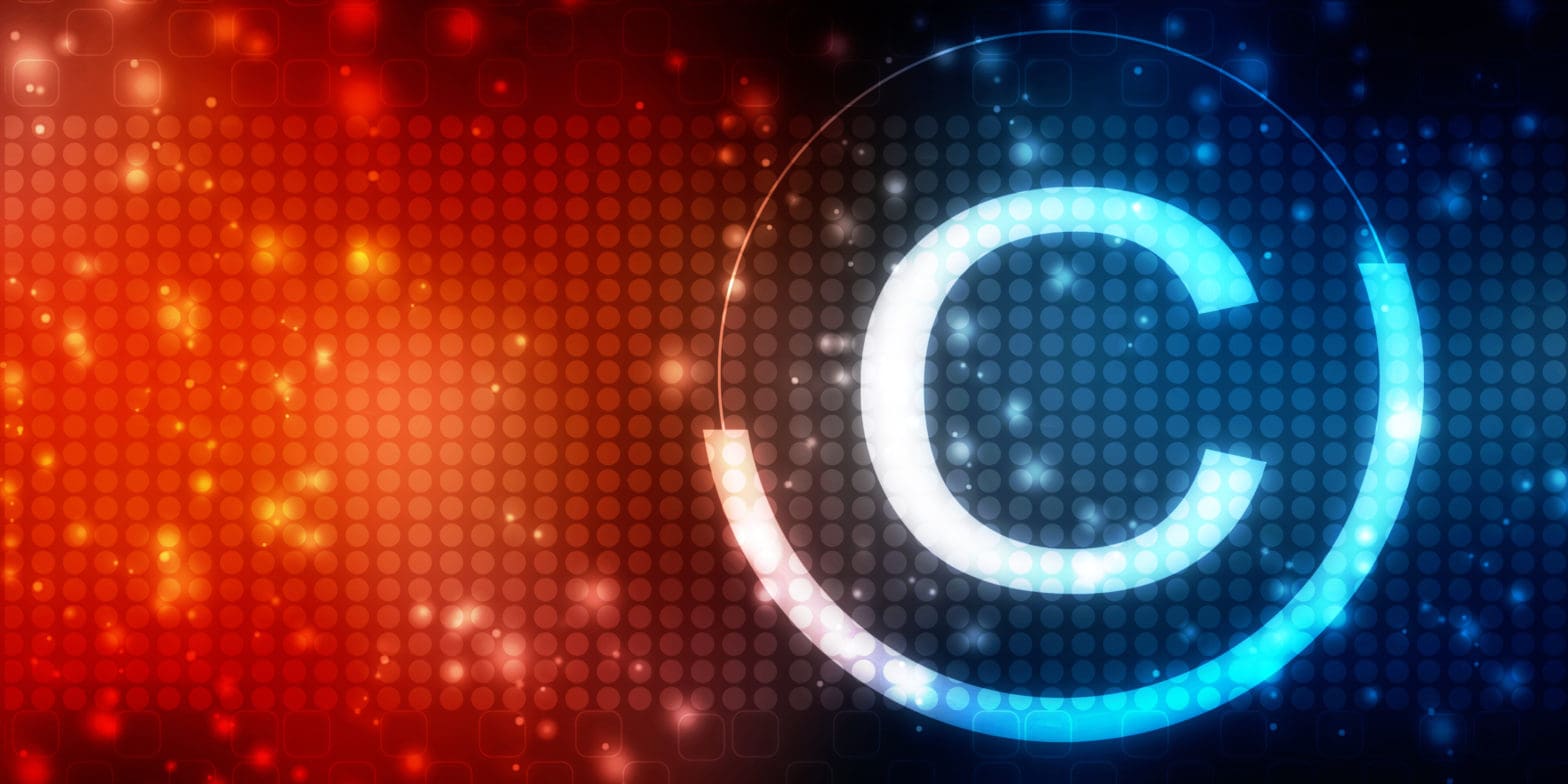
How to avoid copyright music on YouTube is a big question for creators, and it’s the best way to avoid a dreaded copyright strike on Youtube. After all, copyright law is a bit of a grey area on the Internet, and creators often don’t know they’ve violated copyright until they get a content strike.
So when can a YouTube creator use copyright music? What are the rules around using copyright music in content? What constitutes “fair use?” And how do we avoid a copyright strike on YouTube?
YouTube creators might turn to YouTube’s own audio library, but if they’re trying to catch the latest audio trend, they have to use copyright music. So the question might not be “how to avoid copyright music on YouTube,” but rather “when can I use copyright music on YouTube?” Let’s see if we can’t answer both of those questions.
This post discusses the legal implications of using copyrighted music in your videos. We also highlight some of the biggest myths about copyright and music.
We are not lawyers. This is not legal advice. We hope you’ll find our research into copyright music and audio interesting and informative, but it’s no substitute for a good copyright attorney.
get an unfair advantage on YouTube
Give your YouTube channel the upper hand and easily optimize for more views, more subs, and more of every metric that matters.
Music Copyright 101: What Audio Can You Use and When
The easiest way to not violate copyright and avoid a copyright strike on YouTube and is to create 100% original content. But what about using sound effects or a soundtrack in your video? The most important question is, “Am I inhibiting the original creator’s ability to earn money from this work?” Whether or not the creator is making money from their work, you are not allowed to do anything that might inhibit their ability to do so.
Examples would include using a track from a Taylor Swift album as the audio background in a video. How to avoid a copyright strike on YouTube? Don’t do that! If someone could listen to the track via your video, or even rip the audio from your video, you’re inhibiting the original creator’s ability to earn money from their work.
If you’re new to creating videos and want to know the basics of copyright concerning music, YouTube has an excellent overview that is definitely worth watching to bring you up to speed and should help you avoid a copyright strike on YouTube:
So When is it OK to Use Another Creator’s Music in Your Video?
It’s a complicated topic, but if you want to use music that someone else has created, you’ll need to know the legal implications. Obtaining permission depends on the specific piece itself and whether it needs a license or not. Let’s break it down:
Works in the public domain: the only time that you don’t need to secure special permission to use a work is when that work is in the public domain. Public domain (PD) is itself a complex topic but basically, it’s stuff where copyright has expired or where copyright didn’t apply in the first place.
If what you are using isn’t in the public domain, you WILL need to obtain a license to use it. The more formal the license, the more protected you are when using it. Also, keep in mind that many recordings have copyright for the song and the recording of the song itself. In that case, you will actually need to obtain two licenses.
Royalty-free music is still free to use, but it is not in the public domain: there is a distinct difference between them. You still need permission to use royalty-free recordings. Generally, these are afforded as blanket permissions.
Music: The Difference Between Sharing and Stealing
There is a genuine difference between sharing someone’s musical composition and taking the same track and using it solely for your benefit. Let’s take a look at both approaches:
- Sharing is posting the link to your favorite artist’s latest song on your social platform of choice. In this case, the owner retains the digital copy of the piece in question, and you are simply sharing the way to find it.
- Stealing is taking a copy of the music and using it in your YouTube video. When you upload somebody else’s music or content to your own channel, it hinders the artist’s ability to monetize it and likely violates the copyright.
Is Performing a Cover Version of a Song Copyright Violation?
Sad to say but it probably is. Whether or not the copyright would be enforced is the real question here. The number of people covering songs on YouTube suggests that’s unlikely. Of course, it’s a lot more complicated than that, but a cover is your artistic interpretation of somebody else’s work by its very nature. Some ways to avoid a copyright violation here include:
- Create a cover that is transformative. That is to say, you’ve put such an original, creative spin on the piece of work that no one could confuse it for the original.
- Use the YouTube search feature before covering a song to check the music rights. Doing the research will save you real problems later.
- Use royalty-free tracks and check the license.
- Explore the options available to you via YouTube’s own Audio Library.
What Will Happen if I Use Copyrighted Work in My YouTube Video?
At best, nothing will happen, but if you start making money from a piece of work that uses copyright music, that can change quickly. One major determining factor is whether or not you’re making money using the copyrighted work. If so, you’re bound to catch the attention of somebody who wants their cut. Some other things that could occur:
- Your YouTube channel may receive a strike (three strikes and you’re out)
- Your audio may be muted.
- Ads may be placed on your videos, with the benefits going straight to the original artist/publisher.
- You could be sued by the owner of the work you are using.
Fortunately, copyright on YouTube isn’t the black hole it once was; creators can get a glimpse of the site’s action against a video that uses copyrighted music as part of its soundtrack.
ContentID: How YouTube Determines a Copyright Violation
YouTube has a sophisticated copyright tracking system called ContentID. It is an automated system that matches your content against a database of copyrighted material. If the system flags your video, you’ll be notified and you’ll be able to dispute the flag. Your content maybe demonetized or blocked if you don’t appeal or if you appeal and lose.
Here’s more from ContentID from YouTube itself:
The catch here is that, even if you created a unique and original video, that doesn’t mean it will necessarily pass ContentID checks.
Did you use stock audio from your editing program? That music may only be approved for personal use, and uploading it to YouTube and monetizing it, that approval no longer applies.
When asking how to avoid copyright music on YouTube, the best thing to do is to always check the usage rights before you post content that includes something from a third-party source.
What is “Fair Use?” and How Can a Creator Benefit From It?
‘Fair Use’ is a set of exceptions that limit the power behind copyright when another person’s use of a piece of work is considered “fair.” Many of the guidelines surrounding fair use are governed by the Digital Millennium Copyright Act (DMCA), and we encourage you to look at their policies.
Fair use is the ultimate gray area. It’s not clear or directive when it comes to how to avoid copyright music on YouTube — or at least, how to avoid violating copyright guidelines with your YouTube videos. That said, there are a few rules from section 107 of the DMCA can help you determine if what you are doing is fair use:
- The purpose and character of the use, including whether such use is commercial or is for nonprofit educational purposes;
- The nature of the copyrighted work;
- The amount and substantiality of the portion used in relation to the copyrighted work as a whole; and
- The effect of the use upon the potential market for or value of the copyrighted work.
Biggest Myths about Copyright, Music, and Video
So, now that we’ve looked at some of the biggest concerns regarding copyright, music, and video, let’s look at some of the biggest myths surrounding the topic. This should clear up any questions you may have or give you the extra knowledge you need as a video creator:
Nobody has contacted me, so I must not be violating their copyright.
Copyright can be difficult to detect, but that doesn’t mean it isn’t being violated. The longer you benefit from somebody else’s copyright, the harsher the penalty could be when you are discovered.
My work is just a fan video, so I’m covered.
This one is a little complicated: Maybe but not necessarily. The type of use is critical, but not the only way to determine if copyright has been violated. This could fall under fair use, discussed above.
The only time you have a nearly fool-proof chance to monetize these works is if it’s a parody. Comedy, and specifically criticism, is heavily protected by US laws.
I didn’t enable ads on/monetize my video, so it’s fair use.
Making money from a copyright work is the most obvious violation, but just because you’re not trying to cash in doesn’t mean you’re in the clear. The original copyright holder may still be able to force a takedown of your material, even if it’s being used within the bounds of the law. That said, if you haven’t made money with the work, you can avoid a lawsuit.
I didn’t see a copyright notice, so it must not have one.
Think again. Everything created in the US and other major countries is copyrighted and protected immediately, with no action required by the creator. A notice may increase the strength of that copyright and the damages received in the case of a violation, but absence of a copyright notice doesn’t mean absence of copyright.
I found it in the public domain (the internet is public domain, right?)
The internet is public, but that doesn’t make everything on the internet public domain. Far from. Just because you found it on the internet doesn’t mean you’re safe to use it.
I wrote a disclaimer in the description crediting the artist and claiming I had no intention to violate copyright laws.
If only it were that simple. It’s not. If you violate copyright laws, saying that wasn’t your intent changes nothing. Crediting artists (including other creators) who inspire you is right, but it does nothing to change copyright laws.

How to avoid copyright music on YouTube comes down to having a basic understanding of copyright laws. Hopefully, we’ve been able to provide that for you.
Still, copyright is complex and nuanced with room for interpretation. For deeper insight or advice on specifics, you’ll want to speak to an attorney.

Carla Marshall
Carla Marshall is the Content Marketing Manager at TubeBuddy. She has 10+ years of experience in video marketing, social media management, content marketing, DRM, & SEO
get an unfair advantage on YouTube
Give your YouTube channel the upper hand and easily optimize for more views, more subs, and more of every metric that matters.
